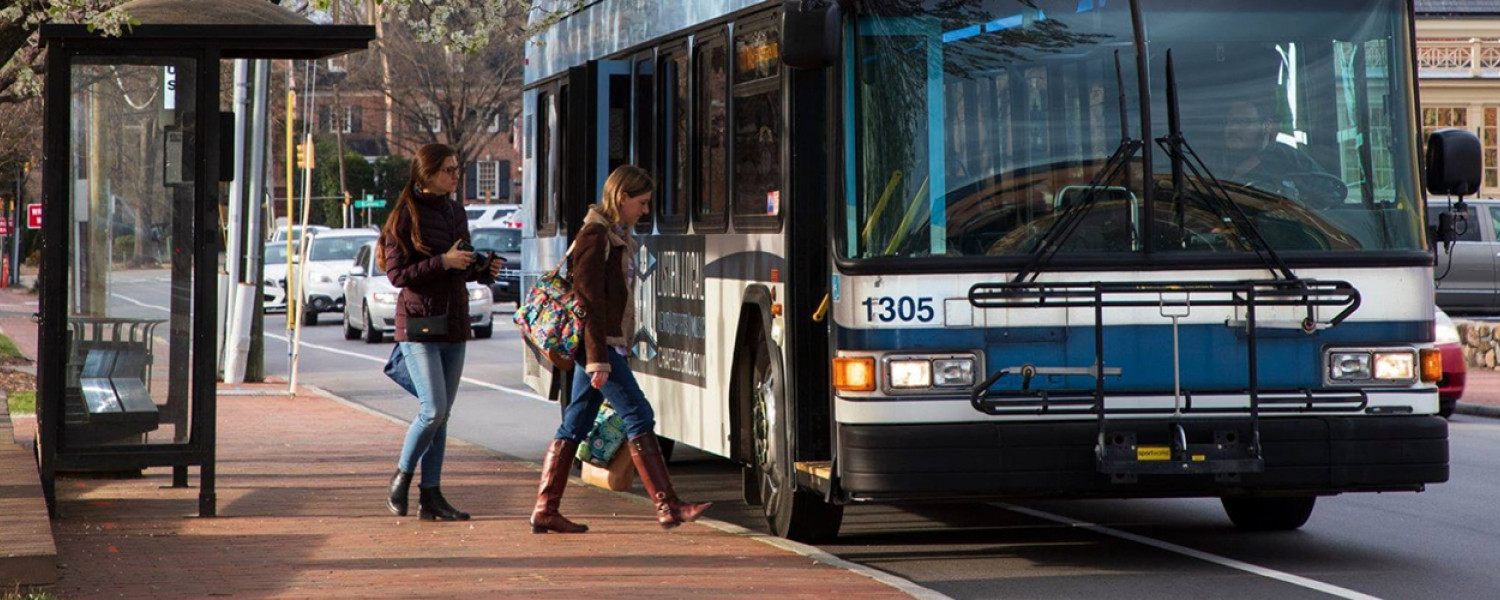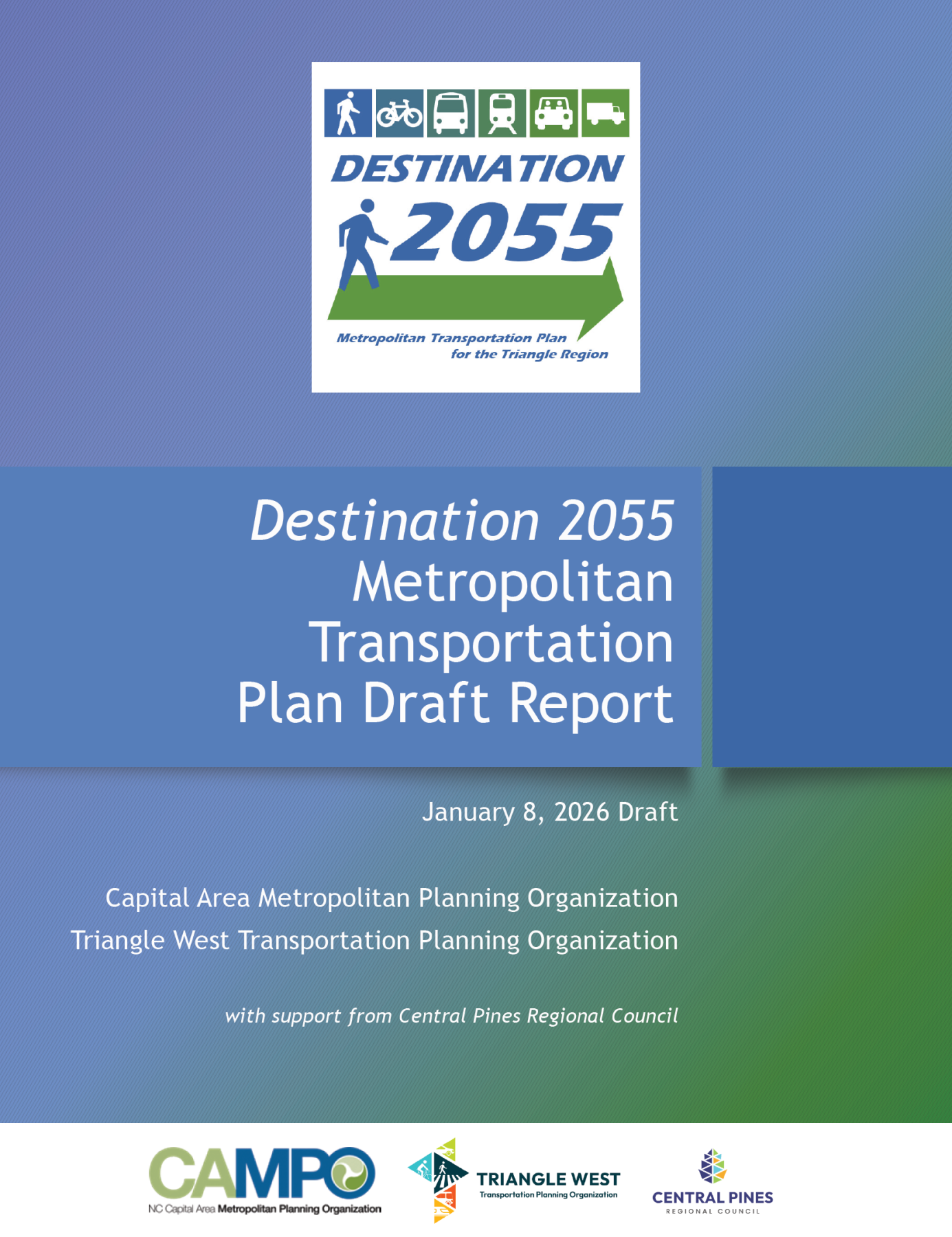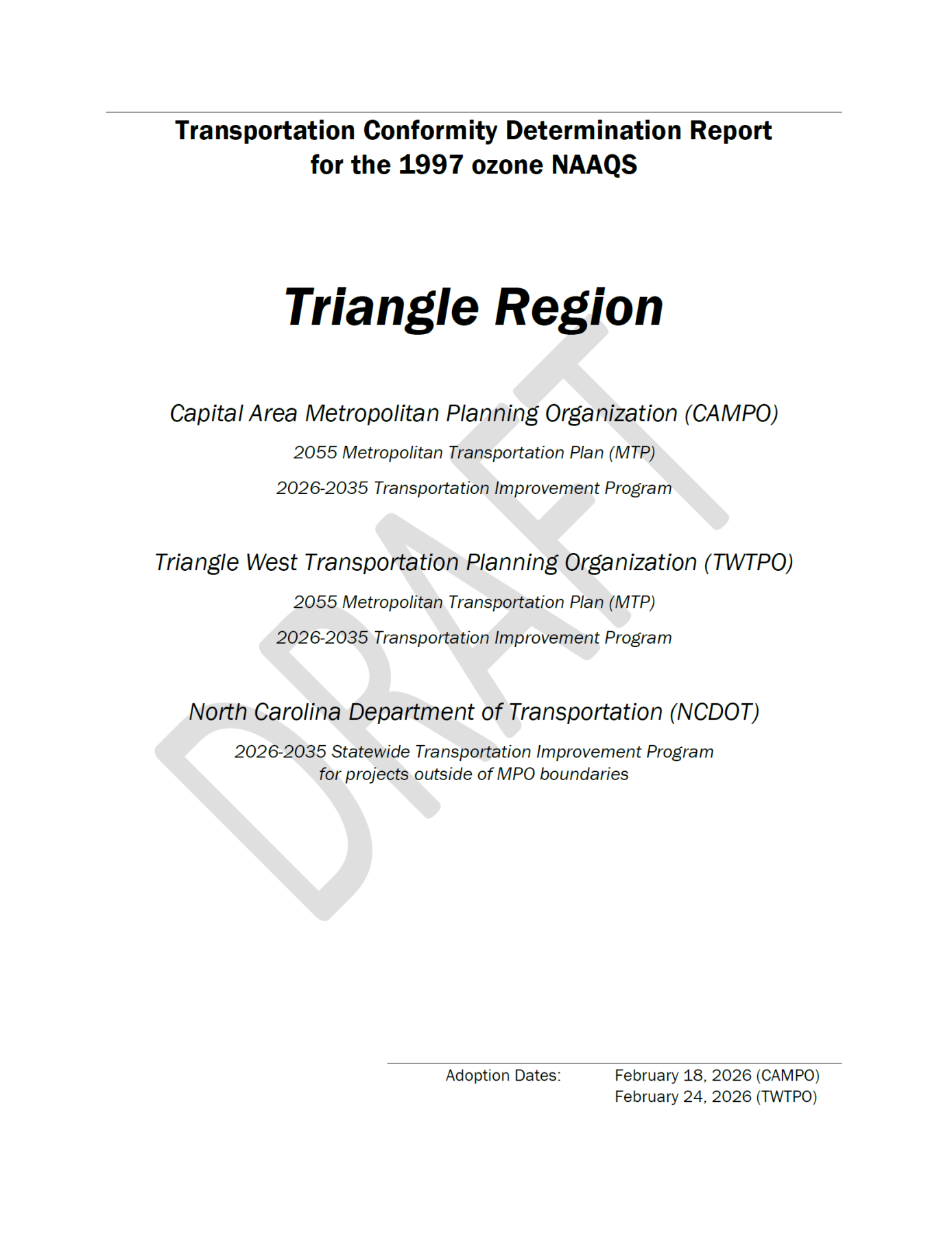The 2050 Metropolitan Transportation Plan (MTP) is Triangle West's TPO's currently adopted MTP, or long-range plan. Engagement to move towards adoption of the 2055 MTP began in November 2023 with the goals and objectives visioning process. This plan will be known publicly as "Destination 2055" and additional details can be found through the designated plan website: Destination2055NC.com. Or, by signing up for updates through the "subscribe" option below.
The federal government requires the TPO to update their MTP at least every five years. The MTP should list the highway, public transportation, bicycle, pedestrian and other transportation projects to be implemented over the next twenty years to address expected travel demand. This long-range plan also has to be based on local land use plans and demonstrate that the expected revenues will cover the expected costs – this is called fiscal constraint.
The MTP allows for two crucial processes to take place as a result of its adoption: MTP projects may be proposed as options to receive state and federal funding, and local governments use the MTP to reserve the right-of-way for future transportation projects.
The tabs on this web page outline the engagement components for updating the plan, and will be updated to include the documents and maps used to develop the 2055 MTP as they become available. The tabs are ordered to coincide with the process; they start with the Goals and Objectives, lead to the Alternatives Analysis, and end with the Adopted Plan.
The StoryMap on this webpage allows readers to follow along as we develop the MTP and provide comments during the MTP Development Process. The MTP Development Process takes place in four (4) main phases with public engagement taking place throughout all phases:
Public Notice: Destination 2055 MTP Final Draft and Transportation Conformity Determination Report Released for Public Comment - January 9, 2026
Read more here: Public Notice Doc Public Notice PDF
The long-range planning process for the Metropolitan Transportation Plan (MTP) begins with an engagement strategy and a schedule. While the Triangle West TPO has an overarching Public Participation Plan (PPP) for all activities, Triangle West works in partnership with the Capital Area Metropolitan Planning Organization (CAMPO) to create an engagement strategy, as the two MPOs share a single MTP.
The engagement strategy lays the groundwork for all engagement that will happen across the MTP update period, which is a fairly lengthy process. Adoption of this plan update is expected to occur around November 2025, which means the full process is expected to take a full two years.
The campaign name for the MTP this cycle is Destination 2055, and more details can be found at Destination2055NC.com.
Below is the expected timeline for public engagement (subject to change):
December 2023 - Goals and Objectives (completed)
April 2025 – Alternatives Analysis
August-September 2025 - Preferred Option
January- February 2025 - Destination 2055 MTP Adoption
Engagement Strategy* (approved for use in November 2023)
*The strategy is subject to change over time based on ongoing engagement needs.
The first public engagement phase is the visioning process that looks at the Goals and Objectives of the plan. Details regarding the public engagement efforts for the Goals and Objectives can be found here. The Board approved the Goals and Objectives at their June 25, 2024 meeting for use in the development of the MTP Destination 2055. The Goals and Objectives used in the development of MTP Destination 2055 can be found here.
To learn more about the MTP, visit Destination2055NC.com.
During Phase 2, Triangle West and CAMPO partner with Central Pines Regional Council to:
- Examine existing conditions
- Forecast future problems
- Develop & analyze alternative scenarios
In this Phase, the following components are completed:
- Pre-MTP Scenarios, often referred to as Testing Scenarios or Learning Scenarios
- Deficiency and Needs Analysis, often referred to as Existed + Committed (E+C)
- Alternatives Analysis.
To learn more about the Alternative Analysis view this presentation from our Virtual Public Meeting hosted in May of 2025. The recording of the Virtual Public Meeting can be found here.
The Preferred Option is a list of transportation projects along with land use and financial assumptions based on the results of the Alternatives Analysis.
Read the Preferred Option report here and view the Preferred Option presentation to the Triangle West Board.
The Public Comment period for the Preferred Option took place between August 27th, 2025 and October 11, 2025. Read the Public Comments received and responses by the Triangle West Staff here.
Public Notices: Public Notice (doc) Public Notice (pdf)
Click on the Image below to view a map of the proposed BRT and passenger rail routes in the 2055 MTP Preferred Option.
Click on the Image below to view a map of the proposed bus transit routes in the 2055 MTP Preferred Option.
Click on the Image below to view a map of the proposed roadway improvements in the 2055 MTP Preferred Option
During Phase 3, Triangle West and CAMPO partner with Central Pines Regional Council to:
- Select the preferred option
- Analyze fiscal feasibility; and
Confirm preferred option
The Destination 2055 Metropolitan Transportation Plan Draft Report is available for review and the Triangle West Transportation Planning Organization is accepting public comments from January 9th, 2026 until February 23rd, 2026.
Draft Report and Conformity Report Public Notice (pdf)
Draft Report and Conformity Report Public Notice (word)
On February 9th, 2026 the previously released draft reports were updated. The second version of the two reports are below, along with a summary of changes.
Destination 2055 Metropolitan Transportation Plan Draft Report - version two(2)
Air Quality Conformity Determination Report - version two(2)
Summary of Changes:
- Updated Table of Contents to add Appendix 16
- Added Acknowledgements page (page iii)
- Updated links to TWTPO online mapping of highway and transit projects on pages 5 and 7, and pages 67 and 69 (now links to newest version of TWTPO AGOL story map)
- Minor updates to Performance Measure naming and page/table formatting in Section 4.4 (pages 27-30)
- Updated Travel Choice Neighborhoods map and data on pages 59 and 61 (original map/data was based on outdated info and needed to be updated)
- Added the missing "Project Portfolio" section of Section 9.3 (starting on page 106) and added the missing values to table 9.3.3
- Corrected Project A480a2 on page 134 to indicate that the project was NOT AQ Exempt (in response to agency comment on Air Quality Conformity document)
- Added links to MPO federally-required Transportation Performance Measure webpages on page 215 (later became 217)
- Updated 2026 safety performance targets for TWTPO in Table A13.2 (page 216 (later became 218))
- Added Appendix 16 (Other Performance Measures), which was not previously available
- Project A943 updated to Horizon Year 2035; previously in the CTP (page 133)
- Project A98b updated to Horizon Year 2045; previously in the CTP (page 140)
- Updated page numbering for Appendices 2-16 due to changes in Appendix 2 that added 2 additional pages
- Updated the map in Figure 2.2.2 on page 12 to include the new section of NC 540 between NC 55 and I-40 (per comment received from public)
- Fixed a typo on page 65 to say "shown" instead of "sown" (per comment received from public)
- Updated Model MOE tables in Appendix 10 based on the results from the final model run
- Added a section in Appendix 16 to show transit-related performance measures (filling in a placeholder from prior document versions)
- Added public notice information in Appendix D
- Added comments received from review agencies and responses to the comments in Appendix E
- Made a correction to project A480a2 to mark this as not exempt (in response to agency comment)
- Added projects A943 and A98b to CAMPO's project list in Appendix A, since these had been moved from the CTP into the MTP horizon years
- Added the following projects to CAMPO's project list in Appendix A, which were mistakenly omitted from the original document: A791, A787, A658, A793, A661, A792, A660, A663, A655, F84, F85, A13d
- Added a note in Appendix E noting the added projects described above
If you need assistance related to this plan, please contact Colleen McGue (See: Staff Directory)


